Harrie Starreveld (The Netherlands) shakuhachi/flutes
Gevorg Dabaghian (Armenia) duduk/zurna
Raphaela Danksagmüller (Austria) duduk/recorder
Ernest Rombout (The Netherlands) musette/oboe/English horn
Anna voor de Wind (The Netherlands) (bass)clarinet
Wu Wei (China/Germany) sheng
Hua Yifei (China) sheng
Naomi Sato (The Netherlands/Japan) sho
Lan Weiwei (China) pipa
Kiya Tabassian (Canada/Iran) setar
Elchin Nagijev (Azerbaijan) tar
Bassem Alkhouri (Germany/Syria) qanun
Makiko Goto (The Netherlands/Japan) koto
Ding Xueer (China) zheng
Ernestine Stoop (The Netherlands) harp
Yang Xue (China) erhu
Dhruba Ghosh (India) sarangi
Elshan Mansurov (Azerbaijan) kamancha
Neva Özgen (Turkey) kemençhe
Dario Calderone (The Netherlands/Italy) doublebass
 Harrie Starreveld (flutes/shakuhachi, The Netherlands) studied flute with Koos Verheul at the Sweelinck Conservatory in Amsterdam. Today Harrie Starreveld is widely regarded as one of the worlds leading specialists in contemporary flute music, working with composers such as Carter, Donatoni, Ferneyhough, Yun, Boulez, Crumb, Harvey, Tan Dun, Loevendie, Weddington and Ton de Leeuw. He is a member of the Nieuw Ensemble since 1982. Together with René Eckhardt and bass-clarinetist Harry Sparnaay he forms Het Trio. As a soloist he performed a large number of flute concertos and worked with conducters such as Ernest Bour, Hans Vonk, Arturo Tamayo and Reinbert de Leeuw. Since 1980, Starreveld has been professor of flute at the Sweelinck Conservatory in Amsterdam and Bremen, regularly gives masterclasses all over the world. He won the prestigious Edison award in 1993 for his CNM Ton de Leeuw-CD and worked at the computer music studios of IRCAM in Paris.
Harrie Starreveld (flutes/shakuhachi, The Netherlands) studied flute with Koos Verheul at the Sweelinck Conservatory in Amsterdam. Today Harrie Starreveld is widely regarded as one of the worlds leading specialists in contemporary flute music, working with composers such as Carter, Donatoni, Ferneyhough, Yun, Boulez, Crumb, Harvey, Tan Dun, Loevendie, Weddington and Ton de Leeuw. He is a member of the Nieuw Ensemble since 1982. Together with René Eckhardt and bass-clarinetist Harry Sparnaay he forms Het Trio. As a soloist he performed a large number of flute concertos and worked with conducters such as Ernest Bour, Hans Vonk, Arturo Tamayo and Reinbert de Leeuw. Since 1980, Starreveld has been professor of flute at the Sweelinck Conservatory in Amsterdam and Bremen, regularly gives masterclasses all over the world. He won the prestigious Edison award in 1993 for his CNM Ton de Leeuw-CD and worked at the computer music studios of IRCAM in Paris.
 Gevorg Dabaghian (duduk/zurna, Armenia), born in 1965 in Yerevan, Armenia, is among the most prominant duduk players today. He continues the work of his predecessors who left their unique heritage in the history of folk music. Dabaghian is one of the first virtuosos to perform excerpts from the Divine Liturgy of the Armenian church on the duduk, an instrument developed nearly 1500 years ago. He is especially famous for his interpretations of the works by Sayat Nova, and for his performances of traditional Armenian folk music. Gevorg Dabaghyan studied at the Yerevan State Conservatory, where he now teaches. In addition, he is the leader of the Shoghaken Folk Ensemble. He cooperates with renowned musicians such as Yo-Yo Ma and Jan Garbarek. In 2001 Dabaghian participated in "The World's Multi-Voice", an international music project in Moscow. The project had the purpose to unite the artistry of folk instrumentalists of different countries. Here Dabaghian played a duet with violinist Gidon Kremer. This was not unusual: the duduk, which has 3000-4000 years of history, still continues to be heard as an instrument that makes sounds of love and beauty, kindness and joy.
Gevorg Dabaghian (duduk/zurna, Armenia), born in 1965 in Yerevan, Armenia, is among the most prominant duduk players today. He continues the work of his predecessors who left their unique heritage in the history of folk music. Dabaghian is one of the first virtuosos to perform excerpts from the Divine Liturgy of the Armenian church on the duduk, an instrument developed nearly 1500 years ago. He is especially famous for his interpretations of the works by Sayat Nova, and for his performances of traditional Armenian folk music. Gevorg Dabaghyan studied at the Yerevan State Conservatory, where he now teaches. In addition, he is the leader of the Shoghaken Folk Ensemble. He cooperates with renowned musicians such as Yo-Yo Ma and Jan Garbarek. In 2001 Dabaghian participated in "The World's Multi-Voice", an international music project in Moscow. The project had the purpose to unite the artistry of folk instrumentalists of different countries. Here Dabaghian played a duet with violinist Gidon Kremer. This was not unusual: the duduk, which has 3000-4000 years of history, still continues to be heard as an instrument that makes sounds of love and beauty, kindness and joy.
Raphaela Danksagmüller (duduk/recorder, Austria) completed her studies at the Wiener Hochschule für Musik und darstellende Kunst, cum laude, and continued to study recorder at the Conservatorium van Amsterdam with Walter van Hauwe. As a soloist and member of various ensembles Raphaela performed in Europe, Asia and the United States. Raphaela performed as a guest with the Nieuw Ensemble, the Nederlands Blazers Ensemble, the Nederlands Vokaal Laboratorium, the Nederlands Kamerorkest, the Nederlands Kamerkoor, the Residentie Orkest and under Frans Brüggen in the Salzburger Festspiele. Raphaela is a member of the Renaissance ensemble Mezza Luna, Ensemble Thouraya and Zerafin. She was awarded prizes at the International Recorder Symposium Calw in Germany, the Early Music Festival in Brugge/ Belgium and at the International Gaudeamus Competition in the Netherlands. Since 2002 Raphaela has been studying duduk with Gevorg Dabaghian in Yerevan, Armenia.
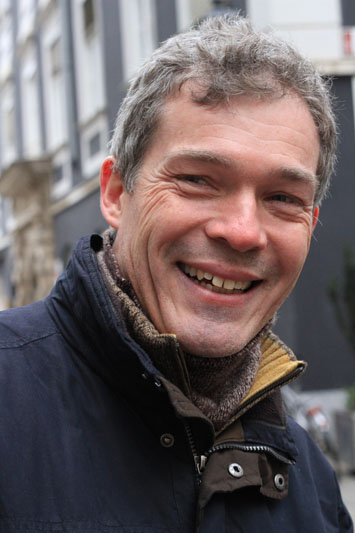 Ernest Rombout (musette/oboe/English horn, The Netherlands) studied oboe with professor Heinz Holliger in Freiburg, Germany. In 1981 he passed his final examinations cum laude after which he studied with Nikolaus Harnoncourt and Maurice Bourgue. He made his debut as a soloist in 1983 in the Concertgebouw in Amsterdam. Since, Ernest Rombout has enjoyed a busy solo career, appearing with established orchestras and ensembles such as the Radio Symphonie Orchester Berlin, The Prague Chamber Orchestra , the Vienna String Soloists and Nieuw Sinfonietta Amsterdam. Inspired by his performance many composers, amongst which Luca Francesconi, David del Puerto, Claudio Ambrosini and – recently – Seung-Ah Oh, have written new works for him. Rombout is professor of oboe at the Conservatory of Utrecht since 1985 and regularly gives masterclasses and workshops. In the summer of 1998 he was a member of the jury of the International Competition for Oboe in Geneva. Ernest Rombout is member of the Nieuw Ensemble since 1985.
Ernest Rombout (musette/oboe/English horn, The Netherlands) studied oboe with professor Heinz Holliger in Freiburg, Germany. In 1981 he passed his final examinations cum laude after which he studied with Nikolaus Harnoncourt and Maurice Bourgue. He made his debut as a soloist in 1983 in the Concertgebouw in Amsterdam. Since, Ernest Rombout has enjoyed a busy solo career, appearing with established orchestras and ensembles such as the Radio Symphonie Orchester Berlin, The Prague Chamber Orchestra , the Vienna String Soloists and Nieuw Sinfonietta Amsterdam. Inspired by his performance many composers, amongst which Luca Francesconi, David del Puerto, Claudio Ambrosini and – recently – Seung-Ah Oh, have written new works for him. Rombout is professor of oboe at the Conservatory of Utrecht since 1985 and regularly gives masterclasses and workshops. In the summer of 1998 he was a member of the jury of the International Competition for Oboe in Geneva. Ernest Rombout is member of the Nieuw Ensemble since 1985.
Anna voor de Wind ((bass)clarinet, The Netherlands) studied at the Conservatory of Amsterdam with Hans Colbers and bassclarinet with Erik van Deuren, graduating cum laude from her Master studies in 2010. In 2011 she completed the International Ensemble Modern Academy and received a Master in Modern music at the Hochschüle of Frankfurt. Anna has a very wide range of work experience, working as a freelancer with many professional orchestras and contemporary music ensembles as well as music-theatre companies. Examples include the Asko Schoenberg Ensemble, Nieuw Ensemble, Ives Ensemble, Veenfabriek and Ensemble Modern. Anna has taken part in many national and international competitions, academies and masterclasses. Anna is active in two ensembles: Looptail and the Amsterdam Collage Ensemble.
 Wu Wei (sheng, China/Germany) was born in 1970 in the Southeast-China Province of Jiangsu and was taught the Chinese violin erhu since the age of five. At the age of 15 he started studying the mouth-organ sheng at the Art Academy of Nanjing and from 1989 till 1993 he continued his study at the international renowned Music Conservatory of Shanghai. In 1993 he became sheng-soloist in the internationally famous Orchestra of Classical Chinese Music Shanghai. Wu Wei can be heard on numerous CD recordings. Concert tours through China, Japan, USA and Europe opened his ear for non-Chinese music traditions. His first projects with European musicians in Shanghai acquainted him with the practice of jazz and new music. In 1995 Wu Wei moved to Berlin, where he broadened his music-horizon by studying Western Jazz traditions and cooperating with musicians of various cultures andmusical styles. Since 1993 Wu Wei appears as soloist or ensemble member in countless international concert venues and many renowned festivals.
Wu Wei (sheng, China/Germany) was born in 1970 in the Southeast-China Province of Jiangsu and was taught the Chinese violin erhu since the age of five. At the age of 15 he started studying the mouth-organ sheng at the Art Academy of Nanjing and from 1989 till 1993 he continued his study at the international renowned Music Conservatory of Shanghai. In 1993 he became sheng-soloist in the internationally famous Orchestra of Classical Chinese Music Shanghai. Wu Wei can be heard on numerous CD recordings. Concert tours through China, Japan, USA and Europe opened his ear for non-Chinese music traditions. His first projects with European musicians in Shanghai acquainted him with the practice of jazz and new music. In 1995 Wu Wei moved to Berlin, where he broadened his music-horizon by studying Western Jazz traditions and cooperating with musicians of various cultures andmusical styles. Since 1993 Wu Wei appears as soloist or ensemble member in countless international concert venues and many renowned festivals.
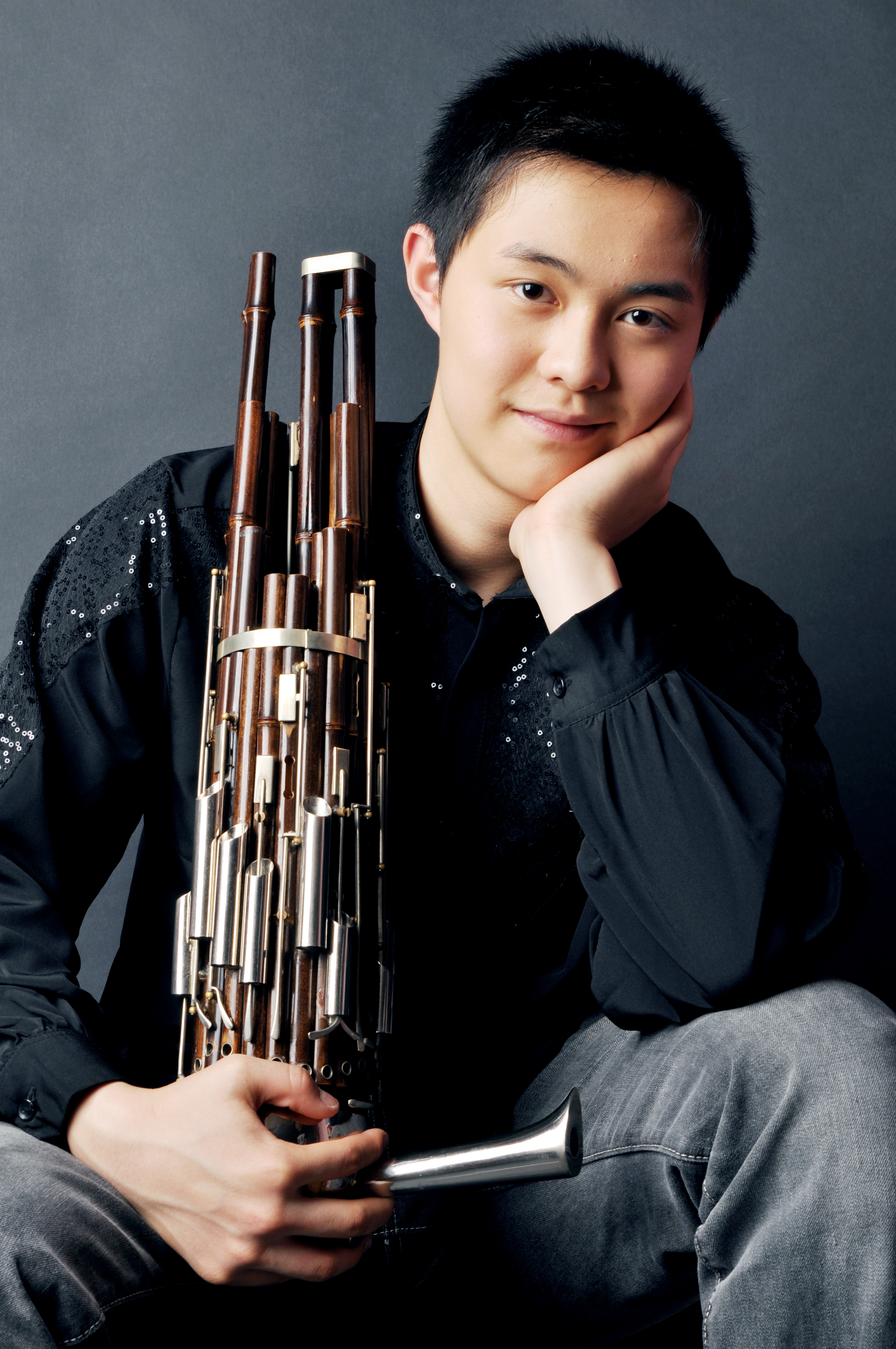 Hua Yifei (sheng, China) is born in the Jiang Su province in China. He started to learn dizi (Chinese bamboo flute) when he was nine, taught by professor Mrs Tang Junqiao. In 2007 he was admitted to the Music Middle School, affiliated to the Shanghai Conservatory of Music. Since then he began to learn the sheng (Chinese traditional wind instrument) from professor Xu Chaoming, who is an authority in the field of sheng. Because of his good academic performance, Yifei has been continuously awarded the People Scholarship for eight times from 2008 to 2013. Since 2013 he is studying at the Shanghai Conservatory of Music in the Department of Chinese Music, with the famous pioneer sheng soloist Wu Wei as his teacher. Yifei went to Australia in 2010 to perform with the Rainbow Ensemble. In 2011 he took part in the Second Session of the International Chinese Instrument Competition in Guang Zhou and won the golden award in the professional junior group of sheng. In 2012 he was awarded the first prize of the Tang Junyuan Educational Foundation, the second prize of Shanghai city scholarship and the outstanding student prize of Star Plan. In 2013 he attended the Jinqi Ensemble as the sheng soloist in Shanghai. They won the second prize in the 9th Golden Bell Prize (a top music prize in China).
Hua Yifei (sheng, China) is born in the Jiang Su province in China. He started to learn dizi (Chinese bamboo flute) when he was nine, taught by professor Mrs Tang Junqiao. In 2007 he was admitted to the Music Middle School, affiliated to the Shanghai Conservatory of Music. Since then he began to learn the sheng (Chinese traditional wind instrument) from professor Xu Chaoming, who is an authority in the field of sheng. Because of his good academic performance, Yifei has been continuously awarded the People Scholarship for eight times from 2008 to 2013. Since 2013 he is studying at the Shanghai Conservatory of Music in the Department of Chinese Music, with the famous pioneer sheng soloist Wu Wei as his teacher. Yifei went to Australia in 2010 to perform with the Rainbow Ensemble. In 2011 he took part in the Second Session of the International Chinese Instrument Competition in Guang Zhou and won the golden award in the professional junior group of sheng. In 2012 he was awarded the first prize of the Tang Junyuan Educational Foundation, the second prize of Shanghai city scholarship and the outstanding student prize of Star Plan. In 2013 he attended the Jinqi Ensemble as the sheng soloist in Shanghai. They won the second prize in the 9th Golden Bell Prize (a top music prize in China).
 Naomi Sato (sho, The Netherlands/Japan) was born in Japan in 1975. She studied sho with Ko Ishikawa and saxophone with Nobuya Sugawa at the Tokyo National University of Fine Arts and Music where she graduated in 1998. After that she continued her saxophone studies with Claude Delangle (France) and with Arno Bornkamp at the Conservatorium of Amsterdam from which she graduated in 2002. Naomi Sato has collaborated with many composers and played with various international ensembles. In the Netherlands she has performed on sho with flutist Harrie Starreveld, saxofone player Olivier Sliepen, the Ives Ensemble and composers Theo Loevendie and Merlijn Twaalfhoven. Naomi Sato was semi-finalist at the Second International Adolphe Sax Concours in Dinant (1998) and won the third prize at the Saxophon Wettbewerb Gustav Bunke in Hannover (1999). She played with the Philharmonic Orchestra of the Tokyo National University of Fine Arts and Music, and the Residentie Orkest/The Hague Philharmonic.
Naomi Sato (sho, The Netherlands/Japan) was born in Japan in 1975. She studied sho with Ko Ishikawa and saxophone with Nobuya Sugawa at the Tokyo National University of Fine Arts and Music where she graduated in 1998. After that she continued her saxophone studies with Claude Delangle (France) and with Arno Bornkamp at the Conservatorium of Amsterdam from which she graduated in 2002. Naomi Sato has collaborated with many composers and played with various international ensembles. In the Netherlands she has performed on sho with flutist Harrie Starreveld, saxofone player Olivier Sliepen, the Ives Ensemble and composers Theo Loevendie and Merlijn Twaalfhoven. Naomi Sato was semi-finalist at the Second International Adolphe Sax Concours in Dinant (1998) and won the third prize at the Saxophon Wettbewerb Gustav Bunke in Hannover (1999). She played with the Philharmonic Orchestra of the Tokyo National University of Fine Arts and Music, and the Residentie Orkest/The Hague Philharmonic.
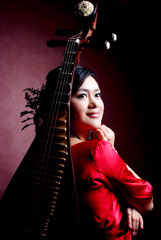 Lan Weiwei (pipa, China) was born in Sichuan province in 1980. She teaches at the Central Conservatory of Music in Beijing China. She has been playing the pipa for more than twenty years. She has won a variety of prizes since her childhood. Lan has performed abroad in Germany, Switzerland, Austria, Mongolia, Azerbaijan, Estonia, Canada, Mexico etc. From the very start of her artistic career she has dedicated herself to introducing the traditional and folk music of China to the Western world. In addition, she has intense passion in playing contemporary music in all possible forms – solo pieces, ensemble music, and concertos with symphony orchestra. She has held recitals in Beijing, Freiburg, Taipei, etc. She has co-operated with various orchestras around China such as in Beijing, Shanghai, Henan, Shanxi, Inner Mongolia, Hongkong as well as in Taipei, Estonia, Freiburg, Toronto.
Lan Weiwei (pipa, China) was born in Sichuan province in 1980. She teaches at the Central Conservatory of Music in Beijing China. She has been playing the pipa for more than twenty years. She has won a variety of prizes since her childhood. Lan has performed abroad in Germany, Switzerland, Austria, Mongolia, Azerbaijan, Estonia, Canada, Mexico etc. From the very start of her artistic career she has dedicated herself to introducing the traditional and folk music of China to the Western world. In addition, she has intense passion in playing contemporary music in all possible forms – solo pieces, ensemble music, and concertos with symphony orchestra. She has held recitals in Beijing, Freiburg, Taipei, etc. She has co-operated with various orchestras around China such as in Beijing, Shanghai, Henan, Shanxi, Inner Mongolia, Hongkong as well as in Taipei, Estonia, Freiburg, Toronto.
 Kiya Tabassian (setar, Canada/Iran) was born in 1976 in Tehran and immigrated to Montreal in 1990. He trained in Persian music under Reza Ghasemi and Kayhan Kalhor and studied musical composition at the Conservatoire de musique de Montréal with Gilles Tremblay. In 1998, he co-founded Constantinople, a Montreal based ensemble, which has earned an international reputation for its unique juxtaposition of early musical sources and the living traditions of the Middle East. He has recorded 11 CDs for the Atma and Analekta labels and has created with Constantinople over 35 original programs performing them at some of the most prestigious festivals and venues. Over the past decade, he has staged nearly 400 concerts in 95 cities in 20 different countries. From 2002 to 2005, he was involved in the international MediMuses research project on the history and repertoire of Mediterranean and Middle-Eastern music lands in several publishing and recording projects. As part of MediMuses, he published several articles on the music of Iran during the Safavid court and recorded a CD compiling the work of Abolhassan Saba together with Hossein Omoumi. Numerous musical groups and institutions have called upon his talents as a composer, including the Nouvel Ensemble Moderne and the Union Européenne de Radio-Télévision. He has also composed music for documentary and feature films, including Jabaroot and Voices of the Unheard. From 2005 to 2011, he was a member of the Conseil des arts de Montréal and the Chairman of the Music Committee for three years. His artistic research and creations receive the support of the Canada Council for the Arts and the Conseil des arts et des lettres du Québec.
Kiya Tabassian (setar, Canada/Iran) was born in 1976 in Tehran and immigrated to Montreal in 1990. He trained in Persian music under Reza Ghasemi and Kayhan Kalhor and studied musical composition at the Conservatoire de musique de Montréal with Gilles Tremblay. In 1998, he co-founded Constantinople, a Montreal based ensemble, which has earned an international reputation for its unique juxtaposition of early musical sources and the living traditions of the Middle East. He has recorded 11 CDs for the Atma and Analekta labels and has created with Constantinople over 35 original programs performing them at some of the most prestigious festivals and venues. Over the past decade, he has staged nearly 400 concerts in 95 cities in 20 different countries. From 2002 to 2005, he was involved in the international MediMuses research project on the history and repertoire of Mediterranean and Middle-Eastern music lands in several publishing and recording projects. As part of MediMuses, he published several articles on the music of Iran during the Safavid court and recorded a CD compiling the work of Abolhassan Saba together with Hossein Omoumi. Numerous musical groups and institutions have called upon his talents as a composer, including the Nouvel Ensemble Moderne and the Union Européenne de Radio-Télévision. He has also composed music for documentary and feature films, including Jabaroot and Voices of the Unheard. From 2005 to 2011, he was a member of the Conseil des arts de Montréal and the Chairman of the Music Committee for three years. His artistic research and creations receive the support of the Canada Council for the Arts and the Conseil des arts et des lettres du Québec.
 Elchin Nagijev (tar, Azerbaijan) was born in 1966 in the Neftchala district in Azerbaijan. He studied his instrument, the tar, at the College for Professional Music from 1982 to 1986 and continued his studies from 1986 to 1993 at the Baku Music Academy. Elchin Nagijev regularly works with kamancha player Elshan Mansurov and is a widely acclaimed performer of the mugam. Presently he is a teacher himself at the Baku Music Academy, responsible for the mugam classes.
Elchin Nagijev (tar, Azerbaijan) was born in 1966 in the Neftchala district in Azerbaijan. He studied his instrument, the tar, at the College for Professional Music from 1982 to 1986 and continued his studies from 1986 to 1993 at the Baku Music Academy. Elchin Nagijev regularly works with kamancha player Elshan Mansurov and is a widely acclaimed performer of the mugam. Presently he is a teacher himself at the Baku Music Academy, responsible for the mugam classes.
 Bassem Alkhouri (qanun, Germany/Syria) was born in 1976 in Damascus. He graduated from the Conservatory in Damascus in 2000 as a specialist in qanun and subsequently won the second prize for playing qanun at the International Music Competition in Algeria. Bassem is also a singer, graduating in opera singing at the Royal Conservatory in The Hague in May 2006 and gaining a Masters degree the following year from the Dutch Opera Academy in Amsterdam. As a soloist Bassem performed with his qanun in many concerts with the National Syrian Symphony Orchestra, as well as giving concerts in Iraq, Lebabon, Egypt, Morocco, Tunesia, Kuwait, France and England. As a singer he performed the solo part in Mozart Requiem at the special opening of the National Opera House of Damascus and in two contemporary opera's by Rokus de Groot and Wim de Ruyter. Since 2003 he is a regular guest musician with the Nieuw Ensemble. Bassem Alkhouri is member of both the Ziggurat Ensemble and the Atlas Ensemble.
Bassem Alkhouri (qanun, Germany/Syria) was born in 1976 in Damascus. He graduated from the Conservatory in Damascus in 2000 as a specialist in qanun and subsequently won the second prize for playing qanun at the International Music Competition in Algeria. Bassem is also a singer, graduating in opera singing at the Royal Conservatory in The Hague in May 2006 and gaining a Masters degree the following year from the Dutch Opera Academy in Amsterdam. As a soloist Bassem performed with his qanun in many concerts with the National Syrian Symphony Orchestra, as well as giving concerts in Iraq, Lebabon, Egypt, Morocco, Tunesia, Kuwait, France and England. As a singer he performed the solo part in Mozart Requiem at the special opening of the National Opera House of Damascus and in two contemporary opera's by Rokus de Groot and Wim de Ruyter. Since 2003 he is a regular guest musician with the Nieuw Ensemble. Bassem Alkhouri is member of both the Ziggurat Ensemble and the Atlas Ensemble.
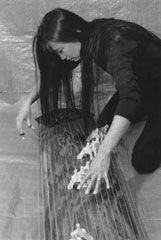 Makiko Goto (koto, The Netherlands/Japan) was born in Tokyo in 1963 and studied under Kazue Sawai and Tadao Sawai at the Sawai Koto School where she received the master degree “Shihan”. In 1986, she moved to Hawaii (USA), where she was an instructor at the Ethnic Music Department of the University of Hawaii and established a branch of the Sawai Koto School. Since 1992, she is living in the Netherlands. Performing both traditional and contemporary music on the traditional koto (with 13-strings) and modern koto instruments (17-string bass koto and 21-string koto) Makiko Goto frequently partiticpated in various ensembles and groups world-wide.
Makiko Goto (koto, The Netherlands/Japan) was born in Tokyo in 1963 and studied under Kazue Sawai and Tadao Sawai at the Sawai Koto School where she received the master degree “Shihan”. In 1986, she moved to Hawaii (USA), where she was an instructor at the Ethnic Music Department of the University of Hawaii and established a branch of the Sawai Koto School. Since 1992, she is living in the Netherlands. Performing both traditional and contemporary music on the traditional koto (with 13-strings) and modern koto instruments (17-string bass koto and 21-string koto) Makiko Goto frequently partiticpated in various ensembles and groups world-wide.
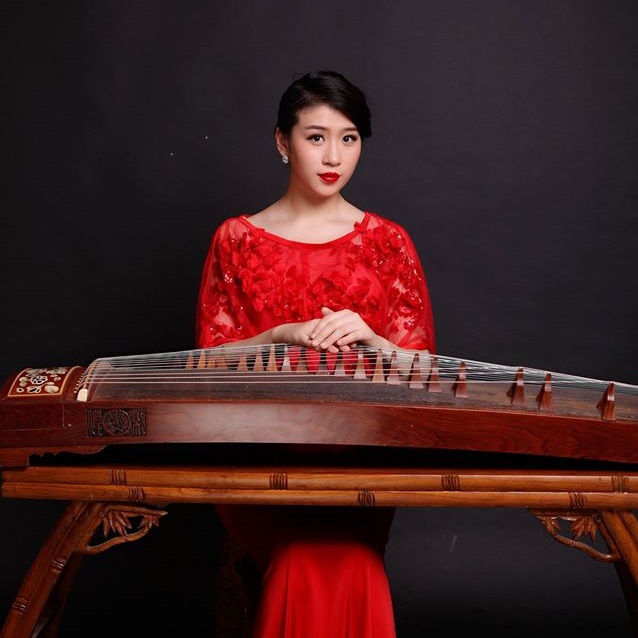 Ding Xueer (zheng, China) started her study in 2001 at the Central Music Institute Accesorial Middle School and continued at the China Central Conservatory of Music in 2007. Xueer won various prizes, played during the Olympic Games 2008 for world leaders and recorded a CD with traditional Chinese music or foreign guests. In 2011 she performed as zheng ambassador in various countries, including Ireland, Japan, Indonesia and the US. Xueer was invited to record with 'Splendid China' as the only Chinese musician, produced by the BBC in 2013. In the same year she performed with the Leipzig Radio Symphony Orchestra and toured in the US. She also collaborated with the China National Symphony Orchestra, Beijing Symphony Orchestra, China Youth Symphony Orchestra and Philadelphia Orchestra.
Ding Xueer (zheng, China) started her study in 2001 at the Central Music Institute Accesorial Middle School and continued at the China Central Conservatory of Music in 2007. Xueer won various prizes, played during the Olympic Games 2008 for world leaders and recorded a CD with traditional Chinese music or foreign guests. In 2011 she performed as zheng ambassador in various countries, including Ireland, Japan, Indonesia and the US. Xueer was invited to record with 'Splendid China' as the only Chinese musician, produced by the BBC in 2013. In the same year she performed with the Leipzig Radio Symphony Orchestra and toured in the US. She also collaborated with the China National Symphony Orchestra, Beijing Symphony Orchestra, China Youth Symphony Orchestra and Philadelphia Orchestra.
 Ernestine Stoop (harp, The Netherlands) studied at the Sweelinck Conservatorium in Amsterdam. She continued her studies with harpist Pierre Jamet and violinist Sandor Végh. After playing for 11 years with the Radio Filharmonic Orchestra, she is now dedicating herself fully to playing as a solist, chamber music and teaching. Stoop is a member of the Nieuw Ensemble and Asko Ensemble and teaches at the Royal College of Music in the Hague and the High School of Music in Tilburg. As a soloist she performed with conductors such as Hans Vonk, Ernest Bour, Jean-Jacques Kantorow, David Porcelijn and Ed Spanjaard. She has enjoyed numerous and productive sessions with composers such as Mauricio Kagel, Isang Yun, Karlheinz Stockhausen, Elliott Carter, Louis Andriessen, Franco Donatoni, Theo Loevendie, Guo Wenjing and Guus Janssen preparing their compositions for first performances.
Ernestine Stoop (harp, The Netherlands) studied at the Sweelinck Conservatorium in Amsterdam. She continued her studies with harpist Pierre Jamet and violinist Sandor Végh. After playing for 11 years with the Radio Filharmonic Orchestra, she is now dedicating herself fully to playing as a solist, chamber music and teaching. Stoop is a member of the Nieuw Ensemble and Asko Ensemble and teaches at the Royal College of Music in the Hague and the High School of Music in Tilburg. As a soloist she performed with conductors such as Hans Vonk, Ernest Bour, Jean-Jacques Kantorow, David Porcelijn and Ed Spanjaard. She has enjoyed numerous and productive sessions with composers such as Mauricio Kagel, Isang Yun, Karlheinz Stockhausen, Elliott Carter, Louis Andriessen, Franco Donatoni, Theo Loevendie, Guo Wenjing and Guus Janssen preparing their compositions for first performances.
 Yang Xue (erhu, China) teaches at the Central Conservatory of Music in Beijing. She was invited to perform at numerous international musical festivals (in Holland, Italy, Japan, Malaysia, Azerbaijan, Hong Kong, Taiwan), and she participated in the 8th Taipei International Traditional Chinese Instrument Association Competition.
Yang Xue (erhu, China) teaches at the Central Conservatory of Music in Beijing. She was invited to perform at numerous international musical festivals (in Holland, Italy, Japan, Malaysia, Azerbaijan, Hong Kong, Taiwan), and she participated in the 8th Taipei International Traditional Chinese Instrument Association Competition.
 Dhruba Ghosh (1957-2017) was one of the leading exponents of the sarangi, the traditional North Indian bowed instrument. The renaissance of the sarangi in India owes much to his development of the instrument's techniques and range of sound and innovations within the fabric of the traditional idiom. He was the son of the tabla-master and teacher Pandit Nikhil Ghosh and owes the mastery of the traditional Bundu-Khan style to many years of study under Ustad Sagiruddin Khan. Dhruba Gosh performed regularly at the music centers of his homeland India accompanying front-ranking North Indian vocalists. Concert tours often took him to Europe, the USA and Japan and he was a frequent guest at several European festivals such as the Helsinki International Music Festival and Silk Route Festival at Athens. He collaborated with Ensemble Modern Frankfurt among other classical, jazz and crossover musicians in the West, having work next to traditional players from diverse origins. He has been at the core of the formation of a World String Orchestra in Japan involving the traditional bowed instruments of Japan, China, Korea, Uzbekistan and India. Dhruba Ghosh was the principal of the Bharatiya Vidya Bhavan’s Sangeet and Nartan Shikshapeeth, Mumbai. He was also a composer of classical and light music of India.
Dhruba Ghosh (1957-2017) was one of the leading exponents of the sarangi, the traditional North Indian bowed instrument. The renaissance of the sarangi in India owes much to his development of the instrument's techniques and range of sound and innovations within the fabric of the traditional idiom. He was the son of the tabla-master and teacher Pandit Nikhil Ghosh and owes the mastery of the traditional Bundu-Khan style to many years of study under Ustad Sagiruddin Khan. Dhruba Gosh performed regularly at the music centers of his homeland India accompanying front-ranking North Indian vocalists. Concert tours often took him to Europe, the USA and Japan and he was a frequent guest at several European festivals such as the Helsinki International Music Festival and Silk Route Festival at Athens. He collaborated with Ensemble Modern Frankfurt among other classical, jazz and crossover musicians in the West, having work next to traditional players from diverse origins. He has been at the core of the formation of a World String Orchestra in Japan involving the traditional bowed instruments of Japan, China, Korea, Uzbekistan and India. Dhruba Ghosh was the principal of the Bharatiya Vidya Bhavan’s Sangeet and Nartan Shikshapeeth, Mumbai. He was also a composer of classical and light music of India.
 Elshan Mansurov (kamancha, Azerbaijan) was born in 1962 in the Gazah district of Azerbaijan. After completing his studies at the College for Professional Music in Azerbaijan in 1981, he continued his musical training at the Baku Music Academy from 1985 until 1990. From 1986 he has worked for many years with the Mugam Trio of the world famous singer Alim Qasimov. One of Mansurov’s major achievements as a professional kamancha player has been winning the first prize at the Folk Musical Instruments Competition. Since 1990 he is professor at the Baku Music Academy.
Elshan Mansurov (kamancha, Azerbaijan) was born in 1962 in the Gazah district of Azerbaijan. After completing his studies at the College for Professional Music in Azerbaijan in 1981, he continued his musical training at the Baku Music Academy from 1985 until 1990. From 1986 he has worked for many years with the Mugam Trio of the world famous singer Alim Qasimov. One of Mansurov’s major achievements as a professional kamancha player has been winning the first prize at the Folk Musical Instruments Competition. Since 1990 he is professor at the Baku Music Academy.
 Neva Özgen (kemençe, Turkey) grew up in Istanbul surrounded by Turkish classical music and jazz. She learned to play the flute but after entering the Istanbul Technical University Conservatory she switched to clarinet. It wasn't long before her interest in Turkish Classical music overtook her interest in Western classical traditions and she decided to study the kemençe, an instrument integral to Turkish classical music. She studied with Alaeddin Yavasca. Neva has deeply immersed herself in the works and taksims of Tanburi Cemil Bey. Like many kemençe players in Turkey today, she aims to continue the tradition established by Tanburi Cemil Bey which was passed on to her father. Ihsan Özgen's influence on his daughter cannot be underestimated and Neva Özgen can be considered a student of what is recognized as the ‘Ihsan Özgen school’ of Turkish classical music. She has accompanied him in performances of Turkish classical music in Europe, the United States and Turkey and is preparing to take over the Anatolia Ensemble.
Neva Özgen (kemençe, Turkey) grew up in Istanbul surrounded by Turkish classical music and jazz. She learned to play the flute but after entering the Istanbul Technical University Conservatory she switched to clarinet. It wasn't long before her interest in Turkish Classical music overtook her interest in Western classical traditions and she decided to study the kemençe, an instrument integral to Turkish classical music. She studied with Alaeddin Yavasca. Neva has deeply immersed herself in the works and taksims of Tanburi Cemil Bey. Like many kemençe players in Turkey today, she aims to continue the tradition established by Tanburi Cemil Bey which was passed on to her father. Ihsan Özgen's influence on his daughter cannot be underestimated and Neva Özgen can be considered a student of what is recognized as the ‘Ihsan Özgen school’ of Turkish classical music. She has accompanied him in performances of Turkish classical music in Europe, the United States and Turkey and is preparing to take over the Anatolia Ensemble.
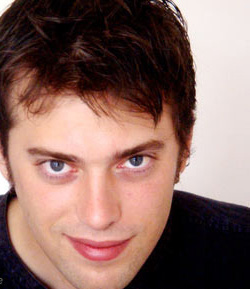 Dario Calderone (double bass, The Netherlands/Italy) graduated in S. Cecilia conservatory of Rome in 2002 with maximum marks with prof. Massimo Giorgi, and Franco Petracchi. After a period spend in different orchestras as solo doublebass, he dedicated almost entirely to the music of the last fifty years, studying with Stefano Scodanibbio and Uli Fussenegger. He is member of Ensemble Algoritmo (it) and Ensemble Laboratorium (ch) and regularly collaborates with various international ensembles, working in close contact with composers such as Salvatore Sciarrino, Beat Furrer, George Aperghis and I. Fedele. In 2010 he founded duo CO2 together with flutist Riccarda Caflisch. He performed many premieres and many solo pieces were dedicated to him. In 2002 he won the “Werther Benzi” solo double bass competition, and in 2006 he got the Stipendiumpreis of the IMD of Darmstadt.
Dario Calderone (double bass, The Netherlands/Italy) graduated in S. Cecilia conservatory of Rome in 2002 with maximum marks with prof. Massimo Giorgi, and Franco Petracchi. After a period spend in different orchestras as solo doublebass, he dedicated almost entirely to the music of the last fifty years, studying with Stefano Scodanibbio and Uli Fussenegger. He is member of Ensemble Algoritmo (it) and Ensemble Laboratorium (ch) and regularly collaborates with various international ensembles, working in close contact with composers such as Salvatore Sciarrino, Beat Furrer, George Aperghis and I. Fedele. In 2010 he founded duo CO2 together with flutist Riccarda Caflisch. He performed many premieres and many solo pieces were dedicated to him. In 2002 he won the “Werther Benzi” solo double bass competition, and in 2006 he got the Stipendiumpreis of the IMD of Darmstadt.










